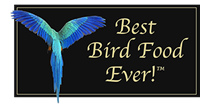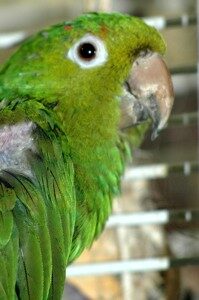
Sir Charles, White-eyed Conure, a rescue.
Numerous diseases, degenerative conditions and even the aging process itself, have been linked to free-radical damage. A free-radical is a highly reactive molecule that can bind to and destroy other molecules. Also known as oxidative damage, free-radical damage can cause irreversible damage to body cells and physiological processes. Feeding your parrots a “Balanced Exotic Avian Maintenance Diet Food Plan”, includes feeding antioxidant rich foods–and this includes our BBFE sprouts. This is going to be the best diet you can feed your parrots. Why? Because our BBFE sprouts contain complete protein, in an easily digested form, and are packed with hundreds of antioxidants.
And feeding foods containing all these nutrients means your birds are receiving foods that nourish their body in thousands of ways. Keep reading to learn more about why having you birds eat a wide variety of antioxidant foods is so important for their good health.
.
Free-radical Damage
Although the body’s natural biochemical processes produce many of the body’s free-radicals, when free-radical levels rise above what the body can control they can begin altering the way the cells code genetic material. This means that these free-radicals damage the DNA in each cell and this causes errors in the way the body puts proteins together. Because of this damage the body’s immune system may mistake these damaged proteins for foreign substances and try to destroy them. Autoimmune diseases occur when the body’s immune system attacks the body’s own cells. The formation of mutated proteins can eventually damage the immune system and lead to leukemia, other types of cancer, and many other diseases.
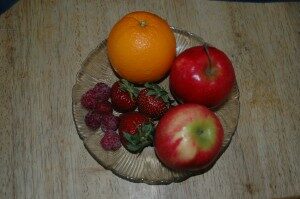
Fresh organic fruits contain a variety of antioxidants.
How Antioxidants Work
Antioxidants, also called free-radical scavengers, are the only way the body can successfully deal with free-radicals. Antioxidants target free-radicals at the molecular level. They do this by combining with the free-radicals. When antioxidants adhere to free-radicals this prevents the free-radicals from being able to bind with, and destroy, the molecules that make up the cells of the body. These cells make up all the vital organs and systems in a bird’s body, such as the nervous system, cardiovascular system and the immune system.
Although many of the fresh fruits, vegetables and sprouts we may already feed our parrots naturally contain antioxidants, because of avian malnutrition it is difficult for a bird consume enough antioxidants from food unless the birds are eating the proper balance of specific foods that provide all of the hundreds of nutrients a parrot or finch must eat every day.
Because the nutritional deficiencies in a bird’s diet, that cause avian malnutrition, compromises the overall wellness and proper functioning of the body–this makes avian malnutrition a true health care emergency. All aspects of a bird’s body chemistry are adversely affected by avian malnutrition. And then when you consider pesticides and pollutants in our environment and chemical residues in food and our water supplies the need for Balanced Nutrition, providing the best parrot diet possible, becomes even more important.
Free-radicals in Our Environment
Exposure to toxins from our surroundings or lifestyle increase the free radical load in the body. Sources include poor indoor air quality, second hand smoke, pesticides, chemical-based cleaning products, personal care and cleaning products that contain artificial synthetic fragrances, artificial colorings and flavorings in process foods, chemical preservatives, radiation, water treatment processes and other chemicals in our food, water or air. What ever your parrot is exposed to his body must process. Limiting exposure to these elements reduces the body’s free-radical load. And when you start feeding a “Balanced Exotic Avian Food Plan” this balance of nutrients supports the body’s ability to more effectively use all the antioxidants in the food being eaten.
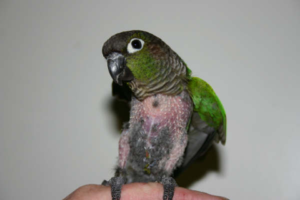
Green-checked conure exhibiting feather destruction habits. Parrots develop this condition in an attempt to cope with stress.
Effects of Stress
It is well documented that emotional stress adversely effects the entire body. When stressed the body uses up antioxidants and essential vitamins, minerals and enzymes at a faster rate. When these vital metabolic nutrients are depleted the body’s ability to metabolize harmful free-radicals stops and oxidative damage occurs. This is where feeding foods that contain high amounts of antioxidants, and enzymes like our BBFE sprouting blends, can help close the gap.
For more information on how stress affects your birds read: Changing Bird Feeding Customs: Understanding the Avian Stress-Response.
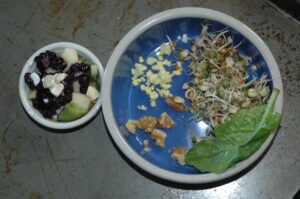
Nutritionally Balanced meal for Elvis, Green-cheeked Conure. BBFE sprouts packed with antioxidants.
More Variety is Best, Best Parrot Diet
Antioxidants come in a variety of forms – each providing unique chemical components when binding to free-radicals. Extensive research data indicates that a combination of antioxidants will provide greater antioxidant protection than any single nutritional antioxidant alone. Fortunately, foods that contain high levels of antioxidants naturally contain a diverse mixture of these life-promoting nutrients.
Antioxidant Types
The best parrot diet you can feed includes feeding important antioxidants such as vitamins A, C and E, beta-carotene, lutein, alpha lipoic acid – a remarkable oxidative-reductive agent and superoxide dismutase (SOD). SOD is the only antioxidant that specifically targets a toxic, free-radical molecule known as superoxide. Another important category of antioxidants include proanthocyanidins.
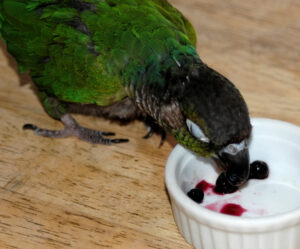
Elvis, Green-cheeked conure loves his blueberries.
Proanthocyanidins
This category of antioxidants belongs to a group of plant pigments called flavonoids. Over 4,000 flavonoid compounds have been classified. Research has shown that flavonoids may be useful in the treatment and prevention of many health conditions. Many of the medicinal actions of foods and juices are directly related to their flavonoid content. Proanthocyanidins are one of the most beneficial groups of plant flavonoids that have powerful antioxidant effects.
Another important biochemical property of proanthocyanidins is their ability to inhibit specific enzymes which are the precursors of arthritic inflammation, degenerative joint disease, allergic reactions and allergies. Proanthocyanidins are found in deep colored fruits such as purple or red grapes, blueberries and pomegranates. These antioxidant rich fruits are an important part of the best parrot diet you can feed.
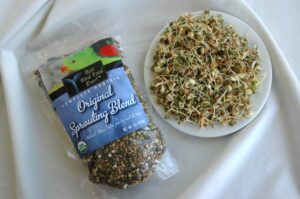
The Best Bird Food Ever! Complete Protein Sprouting Blend and at 3 days growth-ready to feed.
I’ve Learned From My Parrots & Finches
Over the past 17 years my birds have taught me that feeding them a wholesome blend of foods, a blend that provides them all the hundreds of nutrients they must eat everyday, provides them the best diet possible.
Feeding the proper balance of foods is the best way to fully support their good health, well being and longevity. Feeding them this completely balanced nutrition (my ‘Balanced Exotic Avian Maintenance Diet Food Plan’) also helps them to have happy, playful dispositions–parrots who are a joy to live with and play with. Feeding my ‘Balanced Exotic Avian Food Plan’ is the first step in working to heal feather destruction issues, or to help you birds cope with any existing disease condition–or to prevent them from contracting an avian disease.
Balanced Parrot Nutrition is Easy! Best Parrot Diet
And, honestly, following and feeding my ‘Balanced Exotic Avian Maintenance Diet Food Plan”, is really simple and really easy. The companies who make and sell avian nutritional supplements are the ones who want you to think that providing balanced nutrition for your flock is hard–or even impossible. But nothing could be further from the truth. The best way to start feeding your flock a Balanced Food Plan is to start feeding our BBFE sprouting blends. Because BBFE is so nutrient dense, it is the main food–the foundational food–in my ‘Balanced Exotic Avian Food Plan”.
Stay informed–sign up for our Newsletter and learn how easy it is to feed you flock my ‘Balanced Exotic Avian Food Plan”.
